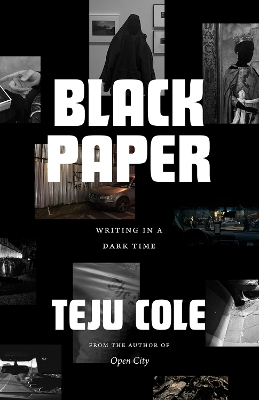Berlin Family Lectures
1 total work
"Darkness is not empty," writes Teju Cole in Black Paper, a collection of essays that meditate on what it means to keep our humanity-and witness the humanity of others-in a time of darkness. Cole is well-known as a master of the essay form, and in Black Paper he is writing at the peak of his skill, as he models how to be closely attentive to experience-to not just see and take in, but to think critically about what we are seeing and not seeing.
Wide-ranging in their subject matter, the essays are connected by ethical questions about what it means to be human and what it means to bear witness, recognizing how our individual present is informed by a collective past. Cole's writings in Black Paper approach the fractured moment of our history through a constellation of interrelated concerns: confrontation with unsettling art, elegies both public and private, the defense of writing in a time of political upheaval, the role of the color black in the visual arts, the use of shadow in photography, and the links between literature and activism. Throughout, Cole gives us intriguing new ways of thinking about the color black and its numerous connotations. As he describes the carbon copy process in his epilogue: "Writing on the top white sheet would transfer the carbon from the black paper onto the bottom white. Black transported the meaning."
Wide-ranging in their subject matter, the essays are connected by ethical questions about what it means to be human and what it means to bear witness, recognizing how our individual present is informed by a collective past. Cole's writings in Black Paper approach the fractured moment of our history through a constellation of interrelated concerns: confrontation with unsettling art, elegies both public and private, the defense of writing in a time of political upheaval, the role of the color black in the visual arts, the use of shadow in photography, and the links between literature and activism. Throughout, Cole gives us intriguing new ways of thinking about the color black and its numerous connotations. As he describes the carbon copy process in his epilogue: "Writing on the top white sheet would transfer the carbon from the black paper onto the bottom white. Black transported the meaning."
